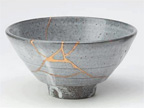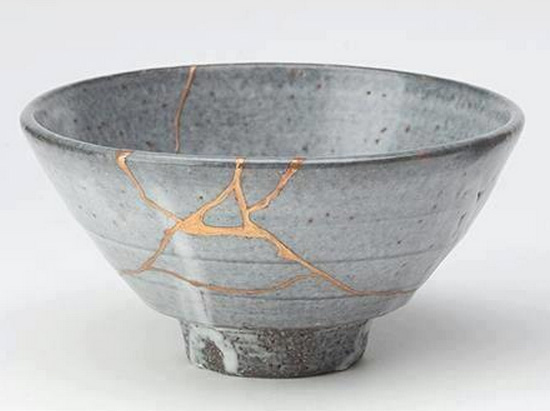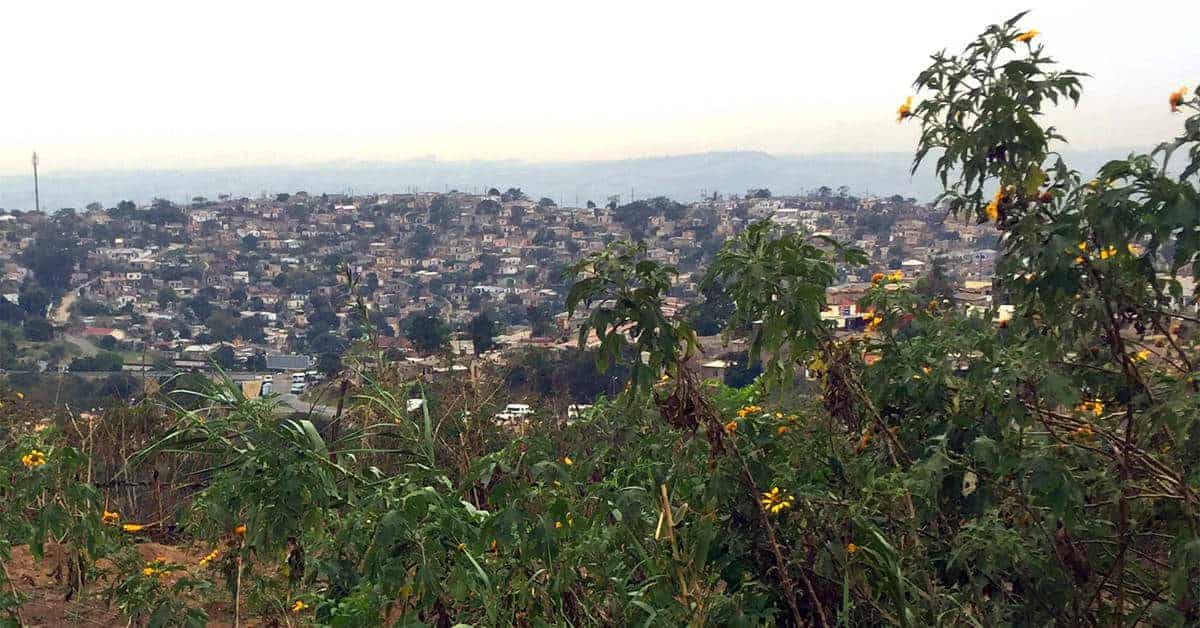 A friend in Japan sent me this image today and I found it quite compelling. It illustrates the art of kintsukuroi, which literally means “to repair with gold.” It is the art of repairing broken pottery with gold or silver lacquer to make the final piece a greater work of art for having been broken.
A friend in Japan sent me this image today and I found it quite compelling. It illustrates the art of kintsukuroi, which literally means “to repair with gold.” It is the art of repairing broken pottery with gold or silver lacquer to make the final piece a greater work of art for having been broken.
I love how image illustrates what my Father does in the brokenness of our world. He’s able to pick up the pieces of our shattered lives and craft them back together in a way that makes us an even better reflection of his glory than we were before. Amazing. Just amazing!
Is that why God is not so easily threatened by the problems and challenges we face in this age? Where we see evil and failure, he sees the opportunity to craft a better piece of art. I’ve been through some horrible things in my life and have suffered some crushing disappointments, but as I look back I see God doing his work of healing in all of them that led me into a greater place of freedom, healing, and joy. Yes, much of that was through many tears and anguish, but I just kept coming to him and surrendering as best I knew to what he was doing in me.
I love where I’ve landed in his life and I know much of the joy that I live now came out of those selfish and arrogant places that were crushed in times of personal failure, betrayal by others, frustration, or grief. As I look back, however, I do see others who were part of those same circumstances that didn’t find the same healing and freedom. Instead their brokenness caused them to withdraw into their own strength and fight harder for those things they think they wanted. They end up imprisoned by their own will in sorrow, stress, and pain. His healing does not come from trying to save ourselves, but only when we give up and come to him and let his healing patch us back together.
And the end result can be so exquisite as you can see below:

One of the phrases Eugene Peterson uses recurrently in his translation of the Bible (The Message) is that Jesus will have “the last word on everything thing and everyone.” He uses that for those Scriptures that talk of Jesus being seated at the right hand of God and all things will be put under his feet. I love that thought.
It’s one I explored further in In Season, because my dad always had the last word on his vineyard. Even though many workers came to harvest the grapes or prune the vines, he was always the last presence passing through his vineyard. He would go behind everyone else and find whatever was missed, fix whatever was wrong, and ensure that it was all just the way he wanted it.
No matter what happens in this age, he will get the last word. He doesn’t have it yet. Many times the wicked seem to prevail and those who cheat seem to get ahead. But if we keep our eyes on him, we’ll be able to see things as they really are and be at peace even in a world that is falling apart around us. Why? Because he can have the last word on everything that happens to you today, and he will have the last word on everything in this entire age soon!






Good post / Couldn’t have come at a better time. God is the Great Potter and we are the clay.
Hi Wayne, thank you for sharing this gem with us. It’s a beautiful picture and I love what you have drawn out from it. It reminds me of something I wrote a couple of years ago where I’d imagined Father putting a broken person back together as good as new. But here you’ve seen a deeper truth – that he creates something even more beautiful than the original.
You are right! Thanks again.
http://jesus.scilla.org.uk/2010/10/thought-unbreaking-pot.html
Good post / Couldn’t have come at a better time. God is the Great Potter and we are the clay.
Hi Wayne, thank you for sharing this gem with us. It’s a beautiful picture and I love what you have drawn out from it. It reminds me of something I wrote a couple of years ago where I’d imagined Father putting a broken person back together as good as new. But here you’ve seen a deeper truth – that he creates something even more beautiful than the original.
You are right! Thanks again.
http://jesus.scilla.org.uk/2010/10/thought-unbreaking-pot.html
Simply beautiful, on all facets! Thanks!
Simply beautiful, on all facets! Thanks!
Thanks for sharing this. I feel like my life is in pieces right now. I keep looking at the pieces and get overwhelmed about how they are going to fit back together. Some of the pieces are career related and the recent God Journey podcasts have been helpful in putting things into perspective also. I need the reminders to relax in the process, even though every time I hear you say that I have an argument with you in my head, I haven’t learned how to relax in the process yet, nor I have I yet learned to fully trust God with all the pieces. I do fully believe what the beautiful picture above represents, that God will make me more beautiful than I am already in the end. I’m learning I had to be broken into pieces to begin to understand each part of me and how God wants to work in my life. I am anxious for the finished product, but I know even what I see as a finished product today will only be the building block for even more growth in the future. I am so grateful that I wholeheartedly believe in the end picture, but long for the peace of the present moment.
Thanks for sharing this. I feel like my life is in pieces right now. I keep looking at the pieces and get overwhelmed about how they are going to fit back together. Some of the pieces are career related and the recent God Journey podcasts have been helpful in putting things into perspective also. I need the reminders to relax in the process, even though every time I hear you say that I have an argument with you in my head, I haven’t learned how to relax in the process yet, nor I have I yet learned to fully trust God with all the pieces. I do fully believe what the beautiful picture above represents, that God will make me more beautiful than I am already in the end. I’m learning I had to be broken into pieces to begin to understand each part of me and how God wants to work in my life. I am anxious for the finished product, but I know even what I see as a finished product today will only be the building block for even more growth in the future. I am so grateful that I wholeheartedly believe in the end picture, but long for the peace of the present moment.
Thanks for sharing this. What struck me about the kintsukuroi process is that it doesn’t try to hide the cracks, but rather seeks to make them beautiful.
Thanks Wayne.
In reading the last part of the blog post, I couldn’t help but think of Psalm 73. It gives me great comfort when at times I’m short on faith, forget that the story has already been concluded, and, hopefully, brings me up short on the wickedness that resides in my own heart as well.
One of the toughest Biblical mandates for me, as spoken by Jesus, concerns repaying good for evil, and loving those that persecute you. Even the passage in Proverbs that likens it to pouring hot coals on someone’s head, doesn’t convince me this is the right response. Yet, it is the only response.
Thanks for sharing this. What struck me about the kintsukuroi process is that it doesn’t try to hide the cracks, but rather seeks to make them beautiful.
Thanks Wayne.
In reading the last part of the blog post, I couldn’t help but think of Psalm 73. It gives me great comfort when at times I’m short on faith, forget that the story has already been concluded, and, hopefully, brings me up short on the wickedness that resides in my own heart as well.
One of the toughest Biblical mandates for me, as spoken by Jesus, concerns repaying good for evil, and loving those that persecute you. Even the passage in Proverbs that likens it to pouring hot coals on someone’s head, doesn’t convince me this is the right response. Yet, it is the only response.